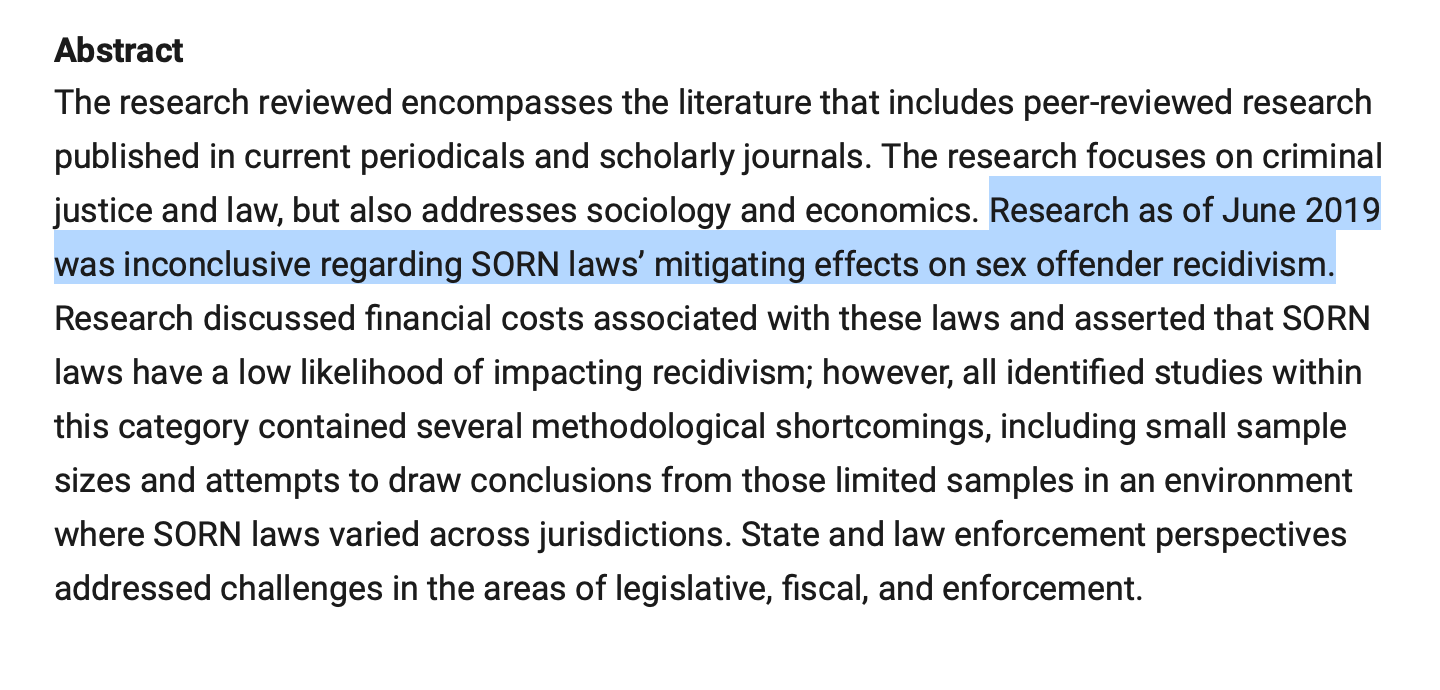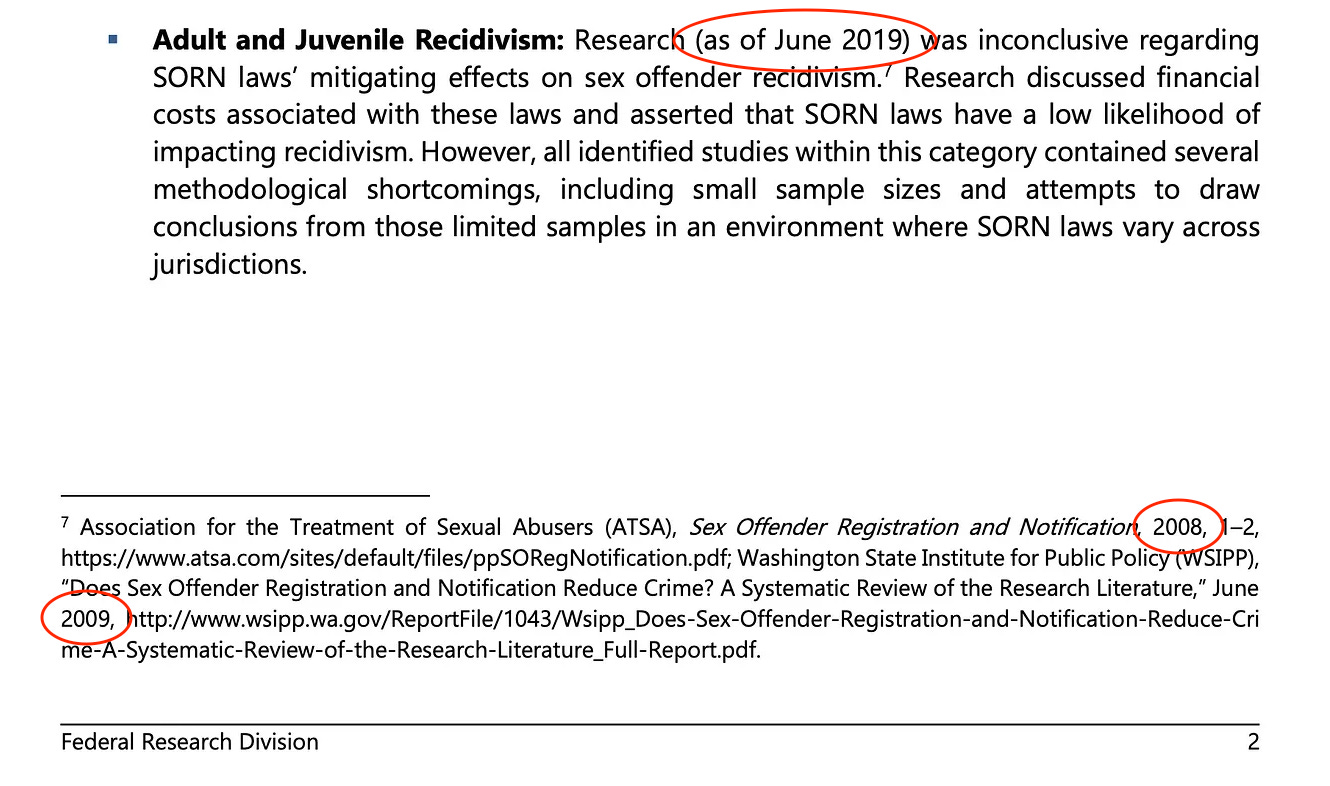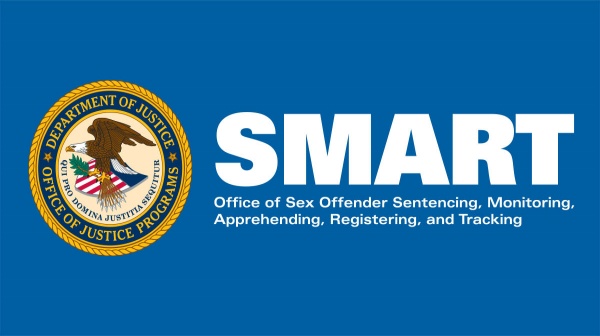How Can You Tell When the Government Is Lying?
Guy Hamilton-Smith — Time for another very exciting post, this time about a research brief commissioned by the federal SMART office — the office responsible for federal policy and implementation with respect to sex offense registration. Who doesn’t love research briefs? I’ve tried to think of a way to make the lede pop a little more here, and the best I can come up with is that the federal government appears to be lying about the state of scientific research in order to justify an extremely costly program that doesn’t do anything except violate the constitutional rights of about a million men, women, children (we put children on the registry too, sometimes for their natural lives!) & their families.
It matters because a (negligently or not) sourcing error, in part, is what led us to have such sprawling, burdensome, and ineffective registries.
The research brief in that was commissioned has the eye-catching title Sex Offender Registration and Notification Act — Summary and Assessment of Research. Published by the Federal Research Division, it reads like police-state apologetics — doing its dead level best to dismiss the research casting doubt on various aspects sex offense registries. I had occasion to review it for a client, and if the title didn’t catch my eye, the abstract certainly did: The top-level conclusion in the abstract is that “as of June 2019” (emphasis added) the research is “inconclusive” regarding the effectiveness of registration. This came as something of a surprise to me, because I’m aware of quite a few studies within the last decade that have found either no effect or a negative effect (i.e., an increase) in recidivism, but none that show it leads to less recidivism (and I feel like if there were one demonstrating effectiveness, it definitely would have been included in this brief).
The top-level conclusion in the abstract is that “as of June 2019” (emphasis added) the research is “inconclusive” regarding the effectiveness of registration. This came as something of a surprise to me, because I’m aware of quite a few studies within the last decade that have found either no effect or a negative effect (i.e., an increase) in recidivism, but none that show it leads to less recidivism (and I feel like if there were one demonstrating effectiveness, it definitely would have been included in this brief).
So I was very eager indeed to see what evidence the Federal Research Division had amassed to support this incredible claim. On page 2, note 7: they cite two sources, one published in 2008, and one published in 2009:

Perhaps it goes without saying, but those sources themselves do not prognosticate about the state of research a decade into the future. Nor does the report grapple with several major research studies over the last decade that have concluded that SORN either do not have an impact on recidivism or make recidivism slightly worse. It simply pretends they do not exist. (1)
I thought it might be a typo at first — never ascribe to malice what you can ascribe to incompetence etc etc — but the 2019 claim is repeated several times, and is a key finding in the abstract. Further, there are two sources that are offered to support the claim, but none of which are from the late 00’s. It’s hard to know what to make of it except that the government is simply lying because it can and no one cares if it’s to keep the public safe from ‘sex offenders.’
Here’s why the research brief matters: the scientific findings related to the effectiveness of registries are relevant to legal arguments about whether or not they constitute punishment, amongst other things. It’s not hard to imagine (if it hasn’t happened already) this getting dropped into an AG’s brief, and then getting regurgitated into an opinion of a court of not-insignificant note, and it becoming judicially accepted “fact” even though it has no support.
It’s happened before.
In the early 00’s, the Supreme Court considered a series of cases regarding extraordinary treatment of people convicted of sex offenses (e.g., whether registration constituted punishment). In those cases, Justice Kennedy claimed that recidivism rates of people convicted of sex offenses was “frightening and high.” The only support for this claim, as Ira and Tara Ellman discovered, was a 1986 Psychology Today article written by a clinician who was marketing his own services as a treatment provider (and who has since repudiated how his statement was used). The Ellmans discovered that the phrase “frightening and high” regarding purported recidivism rates was subsequently cited in 91 judicial opinions and briefs in 101 cases, but that was 8 years ago, and courts and government lawyers are still turning to that very phrase to ward off arguments that registries and registry-related paraphernalia (e.g., exclusion zones, regulation of travel, communication) are unconstitutional.
So a research brief that muddies the waters and concludes (falsely) that the state of research is inconclusive is going to undoubtedly be very attractive to judges looking for a way to punt to the legislature on constitutional claims over registration.
Likely very few people other than myself will care about this as it combines things that your average person would rather not think about: “sex offenders,” research briefs, footnotes, and the federal government. I also realize we are now in an era where SCOTUS openly ignores the factual record in cases to reach a desired conclusion (to say nothing of arguably abandoning stare decisis), so my concern about proper attribution in footnotes is kind of cute and anachronistic. But all the same, I still feel it’s worth spending my Saturday morning to spill some ink about it. (2)


If you’re on the inside looking out this article appears to take a very flippant approach to a very serious problem.
I guess it follows the human stance that if it doesn’t effect me, I don’t care. The evidence presented in the article confirms the current procedures in sex offender law analysis. I call these “outcome” based decisions. They decide the outcome they want and then find the “evidence” to support that decision.
I agree. The government is famous for making the things they wish to support look good, because at the end of the day, if it looks good, the wheel of job security keeps turning. And in my experience, it is about the money. It certainly isn’t about public safety or about preventing recidivism. It is all about looking good. Make the public think the registry keeps them safe. As you said, they decide the outcome, then seek and find the evidence….make it all look good on paper. Kind of like the studies on drugs that are funded by the same pharmaceutical company that made the drug being studied.